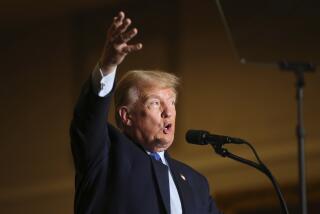Papers shed new light on Eisenhower’s farewell address
Abilene, Kan. — For nearly two years, President Dwight D. Eisenhower and his aides searched for the right words to describe, at the end of his presidency, his fear that the creation of a permanent military apparatus threatened the nation’s livelihood, newly released papers show.
Many months before delivering the farewell address in which he famously warned about the strength of the American “military-industrial complex,” Eisenhower weighed various ideas for the speech, but concerns about the military were always central to his remarks.
The Eisenhower Presidential Library on Friday unveiled previously unseen drafts of the speech that were found recently in a boathouse owned by Eisenhower speechwriter Malcolm Moos.
The documents help explain the origins of the term “military-industrial complex,” which Eisenhower used to warn against unbridled military development. The term was thought to have started as “war-based” industrial complex before becoming “military” in later drafts.
But that theory was based on an oral history from Ralph Williams, one of Eisenhower’s aides. In the new collection, “military” appears in the passage from the first draft.
“What we know now is that ‘military-industrial complex’ was in there all along,” said Valoise Armstrong, the archivist who processed the new papers.
In one draft, the paragraph mentioning the military-industrial complex is riddled with pencil marks deleting entire sentences, but the term itself is unblemished.
Moos’ son, Grant, sent the papers to the library in October after cleaning out a boathouse belonging to the family near Hackensack, Minn. The papers had sat in the boathouse for decades, but Grant’s sister, Kathy, finally suggested that he go through them.
He did, and though they were strewn with pine needles, mouse droppings and other debris, he discovered the papers intact.
“We are just so fortunate that these papers were discovered,” said Karl Weissenbach, director of the library in Abilene. “We were finally able to fill in the gaps of the address. For a number of years, it was apparent that there were gaps.”
One document features a typewritten note from the president lamenting that when he joined the military in 1911, there were 84,000 Army soldiers — a number that had ballooned roughly tenfold by 1960.
“The direct result of this continued high level of defense expenditures has been to create a permanent armaments industry of vast proportions, where none had existed before,” he wrote in the passage, a variation of which made it into the speech delivered on Jan. 17, 1961.
The drafts show that the speech started as a reflection on public service and the role of the military, but it expanded into wide-ranging remarks about the technological revolution and his lament that he never achieved world peace, but avoided a nuclear war.
The papers include 21 previously unknown drafts of the speech — supplementing eight that already were in the library’s possession — showing the evolution of the final presentation, which was originally intended to be given before Congress but was eventually delivered from the Oval Office.
Born in 1890, Eisenhower grew up in Kansas and graduated from West Point. During World War II, he commanded the Allied forces in Europe, including the D-Day invasion of France.
After the war, he became president of Columbia University in New York and the first commander of NATO before running for president in 1952, a campaign that featured the slogan “I like Ike.” He died in 1969.
More to Read
Sign up for Essential California
The most important California stories and recommendations in your inbox every morning.
You may occasionally receive promotional content from the Los Angeles Times.









